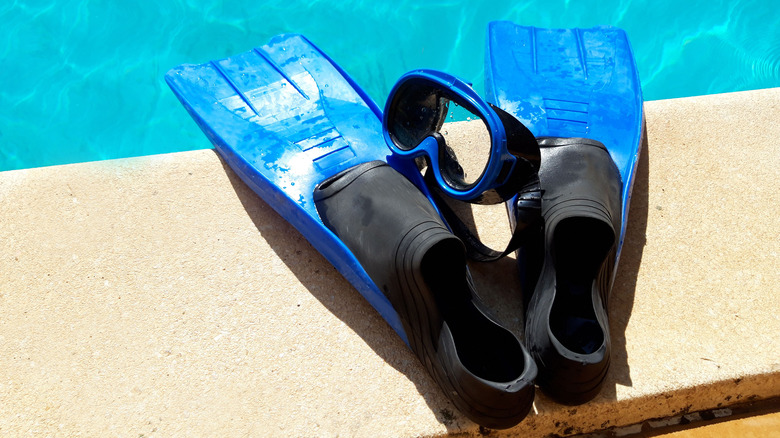Here's Why Benjamin Franklin Invented Swim Fins
Benjamin Franklin was famously a forward-thinker. For example, he freed the two enslaved people he owned long before the rest of the country did. In his written address to the American public in 1789 — nearly a century before the 13th amendment abolished slavery — he clearly explained how he felt about the deplorable practice. "Slavery is such an atrocious debasement of human nature," he wrote, according to PBS, "that its very extirpation, if not performed with solicitous care, may sometimes open a source of serious evils." Indeed, as anyone who advocates for reform to the system that has enabled the United States to have the most prisoners in the world will tell you, Franklin's words were eerily prescient.
But not all of the light bulbs shining over Benjamin Franklin's head had to do with such serious matters of social justice and equality. He was famously a prolific inventor, thinking up things we use to this day, such as bifocals and lightning rods. But according to The Franklin Institute, he patented not a one. His philosophy on giving his inventions to the world: "That as we enjoy great Advantages from the Inventions of others, we should be glad of an Opportunity to serve others by any Invention of ours; and this we should do freely and generously." The man was definitely an inventor for the people, and he got started from an early age, as a young boy who just wanted to swim faster.
Benjamin Franklin invented swim fins when he was just 11 years old
One of Benjamin Franklin's first inventions had classic boyhood written all over it. Such a simple idea that it's hard to believe it took so long for a human to think it up. He was just 11 years old when he took a couple of wooden planks to use as hand fins to help him swim better. According to How Stuff Works, the idea was pretty rudimentary, and that he abandoned the fins, as well as some he'd fashioned for his feet, after they made his wrists tired.
The Franklin Institute cites a passage from an essay the inventor wrote about his earliest contraption titled "On the Art of Swimming," in which he said that despite his physical shortcomings, the invention fulfilled its intended purpose. "I remember I swam faster by means of these [palettes]," he wrote, "but they fatigued my wrists."
Despite his portly appearance as we remember him, Franklin actually played a pivotal role in Americans' love of swimming. (In his autobiography, he claimed to have been a much fitter man when younger, thanks to the swimming.) But it wasn't a thing grownups did during his day, and his promotion of the activity helped popularize it in the fledgling country. He has even been honored by the United States Swim Schools Association Hall of Fame and the International Swimming Hall of Fame.

